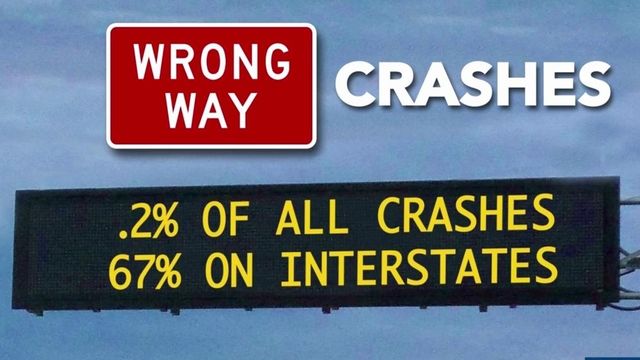NCDOT: Pilot program on I-540 will help curb wrong-way crashes
According to the North Carolina Department of Transportation, there were more than 500 wrong-way crashes between 2000 and 2016.
Another one happened early Wednesday morning, when, according to Durham police, Qianyu Hang, 25, of Raleigh, was driving a white Toyota RAV4 east in the westbound lanes and collided with a FedEx 2018 Volvo 18-wheeler driven by Tyrone Hines, 68, of Pinetops.
While wrong-way crashes represent only 0.2 percent of crashes on North Carolina highways, officials say the number is concerning.
"There's not a lot of wrong-way crashes like this, but because they take place on divided highways for the most part and at high rates of speed," said NCDOT spokesman Steve Abbott.
Wednesday's crash happened just before 1 a.m. and closed most of the westbound lanes of the highway near the Interstate 540 interchange for a few hours overnight. Hang was taken to a local hospital.
Officials say a pilot program, launching this winter, will help harness the technology already available on the Triangle Expressway (N.C. Highway 540 in western Wake County) to curb wrong-way crashes.
The program is similar to one currently being used in Arizona, and uses both cameras mounted on toll gantrys and chips built into the roads to monitor and alert wrong-way drivers, hopefully before a crash.
"That'll be able to detect the vehicle going the wrong way and to alert the highway patrol and get the alert out there that there is a wrong-way driver," Abbott said.
Abbott says it is not clear when or if the program will be expanded.
"It's very expensive to do that, and we have thousands of miles of roadways," he said. "When we have that few crashes you have to justify the cost, even though it saves human lives in some cases, but also, there is a money issue in there too."
But prevention can't fall solely on the shoulders of the DOT, ultimately, he said, everyone has a part to play.
"Most of these accidents the driver is intoxicated, so a lot of the preventative methods, driver behavior, has to play a role in that," Abbott said.
No charges have been filed in Wednesday's crash, but it remains under investigation.
There have been more than seven wrong-way crashes in the last two months in the Triangle area.











